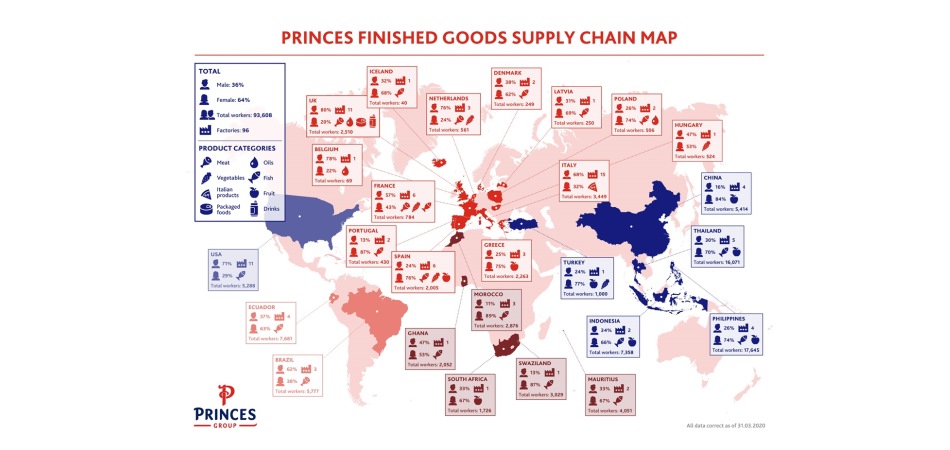International food and drink group, Princes, has published a global map of its imported products supply chain as part of a broader transparency drive for the first time.
The map, which is now available on the Princes Group website, allows retailers and consumers to see where the Group’s finished goods are produced. It highlights the factories Princes sources from in each country, what type of products are supplied, how many employees work there and the workforce gender split. A downloadable factory list also provides a detailed breakdown of this information for all individual sites that supply Princes.
Princes published the map alongside its 2020 Modern Slavery Statement, which outlines progress the Group is making in mitigating and responding to ethical trade challenges across its supply chain, in line with the Modern Slavery Act 2015.
The Group has said it has made progress since becoming a member of ETI two years ago, and aims to reach ‘Achiever’ level status by 2023. The reporting framework is based on the United Nation’s Guiding Principles for Business and Human Rights and the ETI’s Due Diligence framework.
David McDiarmid, corporate relations director at Princes, said: “We continue to improve our supply chain transparency and ensure that our products are not only sourced ethically, but positively impact the lives of those who produce them. Publishing our finished goods supplier map, factory list and progress in tackling modern slavery are all important steps forward in demonstrating our clear commitment to uphold high ethical standards and protect workers throughout our supply chain, as well as build trust in our sustainability efforts among both customers and consumers.”
The company has also recently unveiled a transparency initiative to tell the story of the quality and sustainability of its Napolina brand canned tomatoes through on-pack QR codes, which will allow consumers and customers to better understand the environmental and social impact behind what they’re buying. This is part of the business’s ongoing journey to broaden the transparency of its work and sourcing decisions, and will also extend to Princes brand tuna and other fish products in the Netherlands, as well as own label tuna for Coop Scandinavia this year.
Princes has taken various steps to enhance transparency as well as social sustainability across its tomato supply chain. This includes a recent agreement with Coldiretti, Italy’s leading agricultural union, to provide financial stability for growers through guaranteed three-year supply contracts, while ensuring that the pricing of tomatoes reflects the true costs of farming to enable the long-term sustainability of the industry.
The agreement includes a commitment by Coldiretti farmers to participate in using blockchain digital traceability technology to monitor and protect workers’ safety rights throughout the supply chain.









